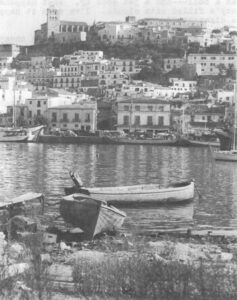October 10, 1972 London
"Each time I change brand of cigarettes A strange cough gets hold of me. Each time I change the country I live in I hate the moment I was born."
— Vassilis Vassilikos, from his poem Piran
"Things go better with Coke!"
— Advertisement
The apartment is too neat.
It is elegant and still in the way some waiting rooms and embassies are. Decorum pushes the visitor to the edge of his chair; transience hangs over the fine furniture like white sheets that movers use.
And then Helen Vlachos sweeps into the room with tea and cigarettes, small cakes and the abundant energy to which her voice gives shape. The effect is one of curtains having been suddenly opened: the room comes alive and one wonders if all Greek women share the same throaty accent whose perfect expression is found in Melina Mercouri.

“It is terrible,” she says without preamble. “A newspaper editor can be jailed in Greece if he prints anything which could cause worry to the public. Well, of course, worry to the public anything can create! If you say that the bread is going to become dearer, you can be put in jail — if they want to take it that way. It isn’t necessary to write against the colonels; to be for McGovern in Greece is to be anti-junta. A friend of mine, the editor of the Athens News, has been put through I-don’t-know-how-many trials because he printed a caricature, a cartoon, of Agnew. To write against Agnew — against Agnew, for goodness sake! — can land you in jail.” She pauses.
“One lump or two?”
It is exactly five years since Helen Vlachos escaped from house arrest in Greece. The wealthy publisher of two conservative Athens newspapers (Kathimerini and Messimvrini), she was arrested with her husband when they refused to publish under the harsh censorship laws imposed by the ruling military junta.
A strong advocate of a free press, she preferred to let her newspapers perish rather than be published. In her refusal she risked everything: wealth, position, marriage, home, and freedom. Her demurral was all the more extraordinary because as a determined anti-communist and respected conservative she was among those whom the new government most wanted to ingratiate.
Mrs. Vlachos has not seen her husband since her escape in 1967. He is unable to leave Greece, and she is unable to return. Her citizenship has been stripped from her for what the junta vaguely calls “anti-national acts” — speeches and articles critical of the dictatorship.
Still, her life in London is not an unhappy one. Her time is spent in conversation with other exiles, in correspondence, and as a working journalist. For some time she published a magazine from England but, she says, “I had to stop. I was blackmailed, you see. They sent a man from Athens who told me that if I wanted my husband to receive medical attention and to be released from solitary confinement, I would have to stop publication. My husband is an old submarine officer — not old, really. He’s younger than me. A former submarine officer. He had a bad ulcer; they wouldn’t allow anyone to see him and he was reduced…. Well, I couldn’t play heroine in London at his expense. I had to kill the magazine.” Her husband served a year in jail for possession of his service revolver.
On a table in the living room is a short-wave receiver tuned to the Voice of America. “I always listen to their news broadcasts,” Mrs. Vlachos explains. “When the Voice of America refers to ‘the Greek junta’ instead of to ‘the government of Greece,’ I’ll know that American policy has changed, that I will soon be able to return home.”
Post-Scarcity Totalitarianism
The image of contemporary Greece that Mrs. Vlachos conveys is a powerful and tragic one. It is a country, she says, whose democratic institutions are stifled by a brutal elite of cynical opportunists. The list of their abuses is long. The power of the colonels, she asserts, is upheld by secret police, political arrests, widespread surveillance, torture, censorship, rigged trials, martial law, blacklists, academic and clerical purges, faked reports, NATO, the CIA, and the fixers.
Her charges are sweeping and well-documented. She offers the investigative reports of impartial European commissions, and the signed statements of prominent Greeks describing their arrest, barbaric imprisonment, savage interrogations, and so on. Names, addresses, and dates are meticulously supplied, and the incidents themselves are reported with a disconcerting matter-of-factness.
Mrs. Vlachos says the coup d’etat of April 21, 1967 was “born of the Pentagon by the CIA, reared by NATO, and surrounded by doting businessmen.” It is a neat way of summing up what many Europeans believe is America’s substantial role in establishing the first European dictatorship to be born after World War II.
According to Mrs. Vlachos and other exiles, the Junta’s coup was motivated and controlled by the CIA. The coup utilized a nucleus of ambitious Greek army officers, NATO tanks, and a NATO contingency plan code-named “Prometheus.” On the night of the coup more than 6,000 persons, ranging in status from laborer to Prime Minister, were arrested, martial law declared, and the King informed of the fait accompli. The alleged motivation of the CIA was to prevent the election of the independently-minded Center Union Party, and to establish an easily-controlled marionette government whose commitment to NATO could not be reversed by troublesome free elections. Moreover, she argues, the American Sixth Fleet, expelled from Libya, supposedly needed a recreative base from which to check Russia’s growing Mediterranean presence. (As a footnote, it is perhaps noteworthy that the present Premier of Greece, George Papadopoulos, one of the leaders of the 1967 coup, was formerly the liason officer between the CIA and its U.S.-funded counterpart, the Greek KYP. In this regard, exiled Greek economist George Yannopoulos has referred to Papadopoulos as “the first CIA agent who has managed to become Prime Minister.”)
“What America is doing,” Mrs. Vlachos says, “is creating a Las Vegas for the Sixth Fleet. The need for such a base is not strategic, but, at best, touristic.”
Devaluation
Since the night of the coup, Mrs. Vlachos claims, Greece has gone downhill. A sort of moral and intellectual devaluation has occurred in which the cream of the professions have been purged, blacklisted, exiled, or forced to leave the country.
“There is a lot of shame in Greece today,” Mrs. Vlachos says. “The people haven’t any guns, and they know they can’t fight the Soviets, America, the CIA, and NATO all at once — and so they are ashamed. Because they are losing a tradition of bravery and courage, of being fighters. Well, they haven’t much choice. All they can do is carry on, but in doing that they support this band of ridiculous and malicious gangsters; the junta. It is bad for their soul. There is a falling off in values throughout Greece. The young, so many people of value, are leaving or have already left. Greece gets impoverished of anything that has any value, and what does it gain in return? Drunken American sailors.”
“Of course,” she adds, “the junta placed a great emphasis on moral issues when it seized power. But all that went in the first week after the coup. It was discarded when they realized they needed tourism. In fact, there have been gambling dens, casinos, only twice in the history of Athens: once during the Nazi occupation, and now again.”
The people who have left Greece are many and diverse. Among them are communists, conservatives, socialists, monarchists, anarchists, and liberals. Their ranks include distinguished composers, poets, lawyers, generals, jurists, professors, architects, and actors, as well as unknown engineers, house-painters, printers, and country people. As a comminity, they lack the political and class uniformity usually found among refugees from the same country.
“The explanation,” Vlachos says, “is that the junta itself has no politics. The coup was a hijacking, a power-grab by ambitious minor officers using the pretext of an ‘imminent communist threat.’ There was no such threat. If there was, why didn’t they inform their superiors? Why didn’t they alert the government or King Constantine?”
While the lives of Greek exiles outside their homeland are not ideally happy, at least their living conditions are not to blame. Because the junta has effectively sought to decapitate the opposition, the exiles tend to be among Greece’s most talented and well-educated citizens: their services have been welcomed at newspapers, universities, and hospitals around the world.
Those Greeks exiled to rural areas within Greece itself are not so fortunate. Isolated from their work and friends, forbidden to receive visits from persons outside their immediate family, they are allotted 65¢ per day as a living allowance. Because the towns-people are warned by police not to converse with the exiles, the latter are cast in the role of village pariahs.
Among these internal exiles are such notables as John Pesmazoglou, former deputy governor of the Bank of Greece, and Anastasios Peponis, former director-general of the National Broadcasting Institute. Both are exiled to Thermon in western Greece. As Niall MacDermot, secretary-general of the International Commission of Jurists, recently described their situation: “None of the exiles have been given any reason for their deportation, other than the general allegation that they are a danger to security. This harsh form of punishment is based on unknown actions alleged in unknown statements made by unknown persons — a completely Kafka-like situation.”
Resistance
One of the questions which invariably arises about Greece is the reason for the limp resistance offered to the colonels over the past five years. True, many Greeks have been jailed for anti-junta activities, but there has so far not been the concerted assault on the regime that many expected. Part of the reason may lie in the fact that the Greek government has always been a relatively remote entity for many Greeks. Further, functional illiteracy is not uncommon in the rural areas, making it even harder for the average Greek to become involved in the political decisions which ultimately affect him. Helen Vlachos offers yet another reason for the seeming passivity.
“Over the past two generations, Greeks have had enough of violence. They’ve fought bloody wars against fascism and communism both. They’re sick of it. But also, the people are not armed. On the night of the coup, for instance, when the secret police arrested thousands — not one gun was found. Not one!”
“And, of course,” she continues, “the junta is very well armed. The other reason for the character of the resistance is that Greece never expected that this political hijacking would be accepted by the allies and by the NATO countries. It seemed not possible. No one thought the junta would be recognized.”
“You know,” she says, “before this happened there had never been a single anti-American protest in Greece — neither from the Right nor from the Left. Now, 90 percent of the bombings (well, really, they are firecrackers) and care that are burned, are anti-American. Twice now, Truman’s statue has been destroyed. Before there was no anti-American feeling. Now there is a disgust directed against the American government.”
“People come to me and say: ‘You are a conservative, Helen, you are on the Right, you cannot say that the Americans are worse than the Russians — would you like communism better?’ But that’s not the question! The fact is that the Americans were our friends, the Russians were not. We were allies. We fought together. So, the fact that our friends are behaving in such an absolutely disgusting and stupid way — well, it’s when your friend betrays you that you feel it more.”
“This is a dangerous game you are playing. I don’t want to exaggerate and say that Greece will become another Vietnam — but it may. And the fact is that at the moment America’s support of the junta is very short-sighted. Because Russia loves the junta. If the Russians wanted to oppose it, they could create havoc through maritime strikes. But they don’t want the junta to fall now because Greece would only return to conservative hands: to the middle Left, or the center. But, if the junta remains in power for five or ten more years, all of the old establishment will be gone. And so, Russia waits for a vacuum to exist. They have nothing to lose. They are happy with the junta and you can see that in the Summer, at the festivals — Western artists refuse to attend, but artists from the communist bloc arrive in droves.”
“But, I don’t know. I don’t know what is going to happen. The junta is very strong. It has the power of brutality and it has the ability to buy people. Will they fall? They should, but if the United States and Russia both help them to stay in power, one for short-sighted Las Vegas reasons, and the other for more long-term clever reasons — who is going to throw them out? If McGovern is elected, well, that is something else, of course.”
“Personally, I think that the only way of getting rid of these little fascists is from another coup — and again it will come from within the army. There have already been small attempts, but the control is too good. The security police are very strong. You can see their strength everywhere in Greece. Of course, there have been waves of resistance groups — that is why there have been waves of trials. But the moment the resistance group forms, within one, two, or six months, they are caught.”
“And the students,” she adds, “are important, but they have been very brutally treated. Their organizations are banned, their leaders jailed, and many are blacklisted from higher education altogether. It is the same story with everything. But I am not so pessimistic, really. I think Greece is rejecting this junta — you know, in the same way that the body sometimes will reject a heart transplant. Suddenly, the foreign heart is just rejected. And that is what I think is happening in Greece.”
” I will be very worldly-wise,” Mrs. Vlachos says, “and not particularly Greek at this moment: I think we need the United States as a moral force in the world. But I do not understand America’s anti-communism and its support of the junta. Because if you are not against brutality, if you are not against torture, if you are not for human rights — then what kind of anti-communist are you? We need a return to Jefferson and Lincoln. That was the America which created your country’s…glamour. But today your ideology is only one of arms and money. It is a terrible failure.”
Some Internal Affairs
Plato’s first banana republic was amply foreshadowed.
“Prometheus,” the contingency plan put into effect by the colonels in 1967, was practised in downtown Athens beforehand. Other foreshadowing had the character of prophecy.
A 1961 Billy Wilder film, “One, Two, Three,” starred Jimmy Cagney in the frantic role of a Coca Cola executive determined to sell the soft drink to the untapped millions behind the Iron Curtain. The ideological hijinx, Cold War puns, and executive manoeuvers made for a silly and cynical film.
Greece, while never backstage of the proverbial curtain, was nevertheless chary of Coca Cola, viewing the American beverage as a potential threat to the local fruit industry (whose product, much of which is grown by owners of small farms, was often made into soft drinks for local consumption).
Today, Coca Cola is as Greek as the Trojan Horse, thanks in large part to Tom Pappas, a wealthy crony of Papadopoulos and holder of both Greek and American citizenship. Pappas, a Nixon intimate, important Republican fund-raiser, and co-chairman of the Finance Committee of the Committee for the Re-Election of the President, is credited with securing the highly-profitable Greek market for Coca Cola in 1968. In return, Pappas had to agree to invest $20 million in fruit-canning plants in Greece, a stipulation designed to ease the burden of competition on local fruit-growers. In May of this year, four years after the original agreement, that pledge was diminished by 87 _ percent to a $2.5 million investment. According to the Greek government the diminution was necessary due to a dearth of raw materials with which to build the canning plants. Coca Cola, however, has reported no such similar problem in acquiring the necessary materials for their own construction requirements.
America’s alleged role in Greek politics was assailed earlier this year when Panayiotis Kanellopoulos, the conservative Greek Premier ousted by the junta, took note of Secretary of State William Rogers’ impending visit to Greece on the Fourth of July. Kanellopoulos called the visit an “unfriendly one” unless it was followed by a reversal in the U.S. government’s attitude toward the Greek regime.
“It would be considered as an act of courtesy toward a regime which has deprived the Greek people of its liberties and as an encouragement for further violations of the principles which made the Fourth of July a great anniversary for all peoples throughout the world who love liberty,” Kanellopoulos, said from within Greece.
Rogers’ visit to Greece was widely interpreted by the press as part of an American effort to push the junta toward liberal reforms. If so, the effort seems to have failed. Within a few weeks of the visit most of the Greek cabinet was forced to resign and, when the re-shuffling was completed, the new cabinet included 12 more of the officers who had been responsible for the 1967 coup. Among the newcomers were a former army commander appointed minister of public order and Alexandros Hadjipetrou, former director of the Central Intelligence Service, became deputy foreign affairs minister. It was hardly a liberalization.
Happy, in a Way
One expects to find the Vlachos household in London plunged into gloom. But it isn’t.
“Frankly,” Mrs. Vlachos says, “this business has given me a new life. I mean I am not — how do you say — I haven’t got any talent for distress or melancholy at all. And I am like someone who has been put on another planet. I’ve changed my life, and I work very hard now. It is very satisfying. Because, you see, when you publish in Greek, in your own newspapers where nobody can stop you — well, you know that you’re a journalist but, somehow, you feel more if you’re asked to write for The New York Times, The Spectator, or The Observor. It’s given me enormous satisfaction.”
“I like London very much, too. And I’ve decided that I am absolutely right in doing what I can. And when you feel you are right, from then on it’s like a war. You can’t say: ‘Oh, I don’t want the Germans, but I don’t want to lose my house and I don’t want to be bombed and I don’t want to do any sacrifice.’ If you decide that you are right, and you go ahead, your self-respect is satisfied. And so I won’t take orders from Mr. Papadopolous or from anyone who hasn’t the right to give me orders. I’m quite happy, in a way. I feel satisfied in having proven to myself that the things I believe in — that I was ready to pay for them. I don’t want to be corny, but it’s true. I have the satisfaction of saying, ‘Well, look, I always believed in freedom of the press and in the respectability of the human being. I’ve always believed it and if I’m the last woman left on earth, I’ll still say I am right and everybody else is wrong.”
And laughing, she turns on the radio.
Received in New York on October 18, 1972
©1972 Jim Hougan
Jim Hougan is an Alicia Patterson Foundation award winner on leave from The Capital Times (Madison, Wis.). This article may be published with credit to Mr. Hougan, The Capital Times, and the Alicia Patterson Foundation.









